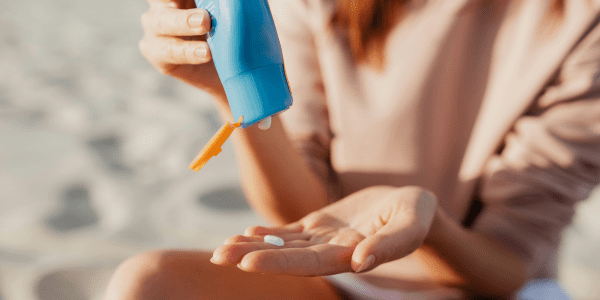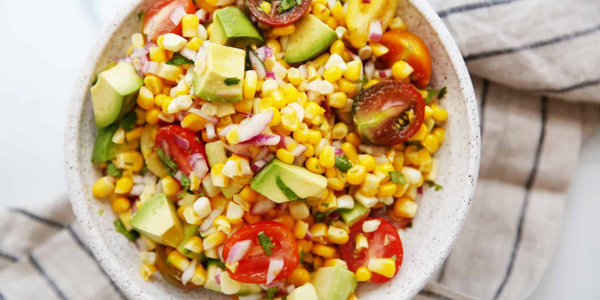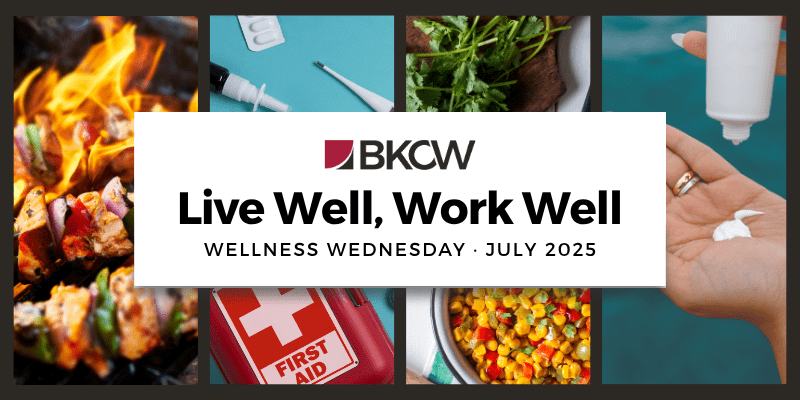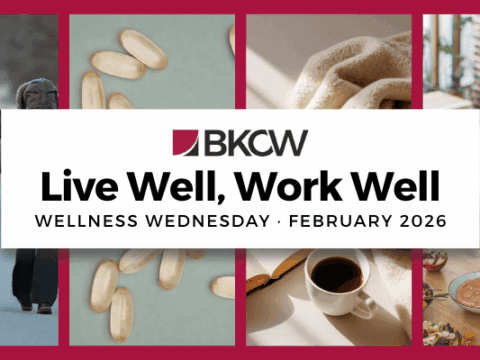- We're Hiring! View Opportunities
- 512-250-5055

BKCW Wellness Wednesday: Sun’s Out, Germs Out — Stay Safe This Summer
June 4, 2025
Taking Care of Yourself During National Wellness Month
August 6, 2025Grilling Safety Tips
Although grilling is a popular way to prepare food, it can also be dangerous. According to the National Fire Protection Association, an average of 9,000 home fires involve grills, hibachis or barbecues each year. May, June, July and August are the most active months for grill fires, with July being the top month
Some 4 million outdoor grills are used across the United States on any given summer day
Keep these 10 fire safety tips in mind when grilling:
- Keep your grill at least 10 feet away from other objects, including your house, decks, outdoor seating and overhanging branches.
- Set up the grill on a flat surface, and don’t bring it into an unventilated or enclosed space (e.g., garage or porch). This is not only a major fire hazard but also a carbon monoxide hazard.
- Check the connection between the propane tank and the fuel line before using a gas grill to ensure it’s not leaking and is working properly.
- Turn off the gas if you suspect that your gas grill is leaking, and get the unit fixed before lighting it. Never use a match to check for leaks.
- Turn off the grill and the gas if your propane grill’s flame goes out, and wait at least five minutes before relighting the grill.
- Only use starter fluid with charcoal grills—never with gas grills.
- Keep children and pets at least 3 feet away from the area until the grill is completely cool.
- Never leave your grill unattended while in use.
- Avoid overloading the grill, as too much fat dripping at once can cause flare-ups.
- Clean the grates and trays regularly to remove grease and fat buildup.
Not only can grills start fires, but they can also cause burns. Exercise caution as you flip food on the grill to ensure your hands and arms do not get burned. Additionally, be sure to use long-handled utensils to help keep your hands at a safe distance from the flames.
Overall, practicing vigilance and taking proper precautions while grilling can help reduce fires and associated burn injuries.
First-aid Kit Essentials
Summer is synonymous with adventure and outdoor fun. Whether exploring a park, swimming, hiking a trail or road-tripping, having a first-aid kit can make all the difference in an emergency.
A well-stocked first-aid kit can help you respond quickly and effectively to common injuries. Keep at least one first-aid kit in your home and your vehicle. Consider stocking these basic first-aid kit supplies:
- Bandages of various sizes
- Elastic bandage wrap
- Flashlight and batteries
- Hydrogen peroxide
- Instant hot and cold packs
- Scissors
- Sterile gauze pads and tape
- Thermometer
- Tweezers

Additionally, you can stock your kit with over-the-counter items, such as aloe vera gel, antihistamines, hydrocortisone cream, pain and fever medications, and sunscreen.
Ongoing, remember to check the expiration dates and make sure you haven’t used up items and need replacements
Understanding the Label on Your Sunscreen
Skin cancer is the most common cancer in the United States. Most cases of melanoma, the deadliest kind of skin cancer, are caused by exposure to ultraviolet (UV) light. The sun’s rays can damage your skin in as little as 15 minutes. While there are several steps you can take to limit your exposure to the sun, proper sunscreen selection and application are critical
The Environmental Working Group (EWG) analyzed more than 2,200 sunscreens available for purchase in 2025. The EWG report revealed that just one-fourth of sunscreens on store shelves provide safe and effective protection

Remember that not all sunscreens are created equal, so it’s about finding the one you need for the specific weather and activity. Sunscreen labels must follow specific guidelines, so here’s what they exactly mean:
- Broad-spectrum protection works against UVA (skin cancer and premature aging) and UVB (sunburn rays).
- SPF is the level of protection against UVB rays. Experts recommend using sunscreen with an SPF value of at least 30.
- Water-resistant sunscreen needs to be reapplied, depending on the brand, after 40 or 80 minutes of swimming or excessive swimming.
- Sunscreens maintain their full strength for three years but always check the expiration date.
Routinely inspect your skin for any spots or changes in color or appearance. If you have any concerns, talk to your doctor.

RECIPE OF THE MONTH
Avocado and Corn Salsa
Makes: 5 servings
Ingredients
- 1 avocado (diced)
- ¾ cup frozen corn kernels (thawed)
- ½ cup grape tomatoes (quartered)
- 1 Tbsp. fresh cilantro (chopped)
- 2 tsp. lime juice
- ¼ tsp. salt
Preparations
- Toss the avocado, corn, tomatoes, cilantro, lime juice and salt in a medium bowl.
- Chill for one hour and then serve
Nutritional Information (per serving)
- Total calories: 67
- Total fat: 4 g
- Protein: 1 g
- Sodium: 119 mg
- Carbohydrate: 8 g
- Dietary fiber: 3 g
- Saturated fat: 1 g
- Total sugars: 1 g




